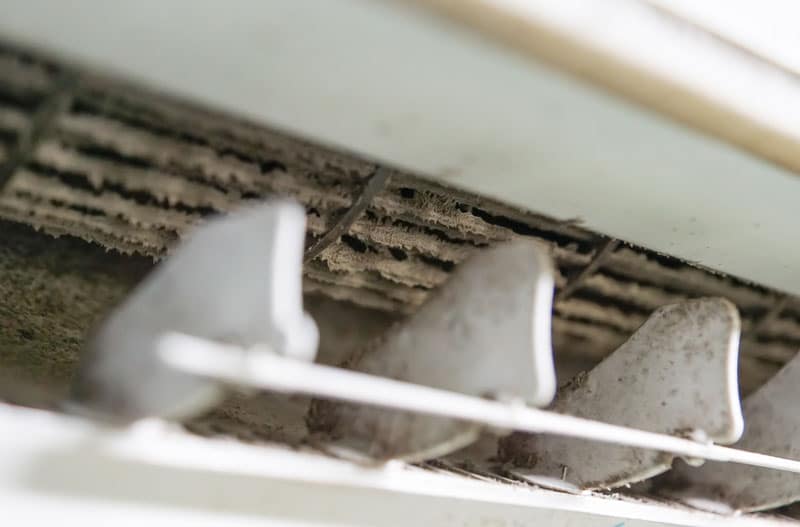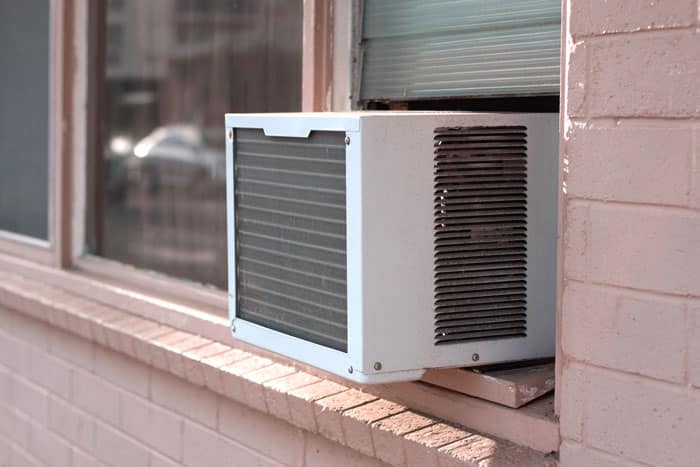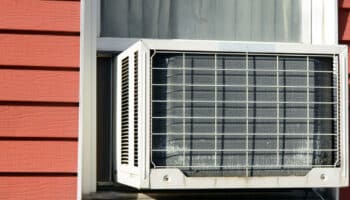We've independently reviewed this article to make sure it's as accurate as we can make it.
To find out more about our article creation and review process, check out our editorial guidelines.
Stuck trying to figure out why your air conditioner smells?
Don’t worry, I’ve been there too. Entering your home expecting refreshing, cool air, only to be met with an unpleasant scent that’s spread throughout your entire house can be super annoying.
Luckily, you’ve come to the right place to fix this issue.
If your air conditioner has a musty, acidic, or ammonia-like smell, chances are you have mold. But if there’s a sweet but unpleasant odor, like ether or chloroform, you might have a Freon leak.
Please note that the advice in this article is for lighter types of green and white mold. If the mold you see on your AC, or anywhere in your home, is brown or black – please DON’T try to clean it yourself! This will only spread mold spores around. You need to call a specialist instead.
Want to know how to fix these common AC problems? Then keep reading.
The Dangers of Air Conditioner Mold
Mold is a fuzzy, opportunistic fungus that loves wet, dark places. That can make your air conditioner the perfect place for mold to grow – especially if it’s dirty.
Mold also needs an organic substrate, which is where the dirt comes in. If the inside of your air conditioner is dirty, then mold has everything it needs to take over.

When that happens, your health is in danger. According to the CDC, mold can cause everything from stuffy noses and headaches to chronic lung infections. Mold is also connected to childhood asthma and allergies.
And as you can imagine, mold in an appliance that’s literally designed to blow air throughout your house only intensifies these effects.
That’s why it’s so important to clean mold out of your air conditioner. I’ve written a whole post on cleaning moldy air conditioners, but here are the basics:
- Wear a mask. There’s no reason to inhale more mold spores than you need to.
- Wear gloves. The easiest way to get rid of mold is to use a bleach solution, and you need to protect your skin from the bleach.
- Never clean your AC unit while it’s running. Let it sit for a little bit before you get started.
- Gently scrub the coils in your unit to prevent moisture from gathering on dirt.
- Fix any water leaks you might find to prevent future mold infestations.
If you want to learn more about cleaning out mold specifically, you can read more here.
What Does Freon Leak Smell Like?
Freon smells sweet, kind of like chloroform or ether, but it’s not a pleasant smell. It is a colorless gas that’s found in many older refrigerators and air conditioners.
Refrigerants, including Freon, are supposed to be kept in a closed system inside your air conditioner. However, over time the closed coolant system may develop cracks, especially around the seals. As a result, you may notice a sweet smell coming from your AC.
That being said, it’s very unlikely you will hear or smell a refrigerant leak. It will typically come from a microcrack, and in such small amounts over time that you’ll never notice.
If this is the case, though, then you’ll need to address a more severe issue. In some cases, you may just need to replace a gasket connecting the coolant tubes to the compressor. However, if the tubes themselves have cracked, you may need to replace your AC unit completely – or at least have a technician come out to make the repair.
If you want to get any replacement part – or see how much one would cost – click to enter your model number in the search bar below. Our partners at AppliancePartsPros stock almost every part with free guides on how to install them.

Checking where a Freon leak is happening isn’t easy – and you typically need specialist equipment to spot it.
If you believe you know where it’s coming from, you can try a solution of 50% water and 50% dish soap – brushed around the gaskets and copper U-bends on the coils. As well as anywhere that could vibrate against other materials. If you see bubbles forming anywhere, that could be the site of your leak.
How to Keep Your Air Conditioner Running Well
Cleaning your air conditioner regularly is the most important thing you can do to keep it from smelling musty or sweet.
It breaks up mold colonies before they can form and helps get rid of standing puddles that could invite pests. It doesn’t have to be difficult to clean your AC, either.
How to Clean an AC
Once you’ve identified and treated the cause of your smelly AC unit, you can focus on maintaining it for the future.

Here’s how to maintain your AC unit for consistent, quality air conditioning.
- Always turn off your AC unit before doing any maintenance work. Air conditioners almost always have at least a little condensed water inside of them. It’s safest to keep water and electricity far apart.
- Pop off any access covers and dust them off. Set them aside until you’re done with the rest of the maintenance.
- Remove dust and debris from the condenser coils and vents. Use a garden hose with a light amount of pressure to do it. Having dirt inside your AC unit can not only invite mold but also reduces the unit’s efficiency and wastes electricity.
- Remove the air filter and rinse it in the sink. If it’s particularly dirty, you can soak it in a dish soap and water solution, then rinse again. Let it dry thoroughly before replacing it.
- Check your AC unit’s coils for bent cooling fins. These fins are where your AC absorbs heat and cools your home. Bent fins reduce your AC unit’s efficiency. If you notice a bunch of bent fins, you can use a “fin comb” to unbend all of them at once.
- Take out the drip tray and drain it. You should do it regularly, even when you aren’t going through the whole maintenance process. If you notice mold in your drip tray, it’s probably not the only mold in the AC unit. That’s a sign to clean things more thoroughly.
- If your AC unit has a drainage hose, check it for leaks and clogs. If water runs through it smoothly, you’re good to go. If it doesn’t flow evenly or seems to back up, you can try to unplug the hose with a wet-dry vacuum or simply get a new hose.
- Let everything dry, then replace the access covers and try turning on the AC unit. If it smells clean and seems to run well, then you’re all set for summer.
Other AC Tips and Tricks
There’s more to a properly functioning AC unit than just keeping it clean. Here are a few other tips and tricks to keep your AC in top condition all summer long.
#1 Run Your AC Regularly
Some places only get hot enough to justify an air conditioner on occasion. However, running your AC unit infrequently gives mold a place to flourish.
The air blowing through your AC unit can actually help dry it out and disrupt mold from growing. Even if it’s not too hot outside, run your AC at least every other day.
You can just run it on the “fan” or “blow” setting to avoid chilling yourself. This will help keep it nice and dry and prevent any unwanted mold from setting up inside the unit.
#2 Keep Your AC Away from Heat Sources
Most air conditioner units have a built-in thermostat to tell when they’ve cooled a room to the right temperature.
Don’t confuse that thermostat by keeping your AC right next to something that generates heat. That will just make the unit work harder than it has to and waste electricity.
For example, if you have a window AC unit in your kitchen, put the AC in a window away from the stove. Keeping it too close to that much heat may cause the unit to overtax itself and stress the compressor.
An overtaxed compressor can lead to vibrations and refrigerant leaks. It will also lead to more condensation inside the machine.
Long story short: just keep your AC away from your other, hotter appliances.
#3 Keep Humidity Down
Even if your air conditioner is kept clean, humidity is the biggest cause of mold in your AC. Just like a cold glass of lemonade on a humid day, the inside of your air conditioner gets covered by condensed water when there’s a lot of water in the air. That water feeds mold and mildew like nothing else.
Keeping humidity as low as possible in the summer can help you avoid this. There are a few ways to keep the humidity down indoors:
- Open up your window a crack when showering to vent steam outside.
- Run a dehumidifier in the same room as your air conditioner.
- Dry your clothes in a dryer instead of on indoor racks.
- Avoid boiling water unless necessary.
These tactics can help you keep your home dry inside, and as a result, keep mold from moving in.
Conclusion
An air conditioner that smells bad is bad for your summer and bad for your health. Your lungs deserve better.
If you’ve been noticing a strange smell every time your air conditioner kicks in, your AC unit is probably moldy or leaking dangerous refrigerants. Maintaining your AC unit and getting rid of any mold or leaks can completely turn your health and summer around.
That’s why it’s so important to keep your unit in good condition. Clean your AC, and your summer allergies may disappear entirely.
If this article was helpful to you, why not check out some of our other free guides or sign up for our mailing list? We work to provide helpful, useful information that’s relevant to what you need.
Have a great day, and thanks for reading!
-Craig







